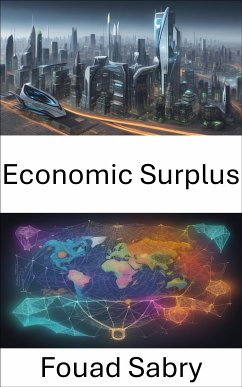What is Economic Surplus
In conventional economics, the term "economic surplus," which is often referred to as "total welfare," "total social welfare," or "Maryland surplus," refers to one of two values that are related to one another:Consumer surplus, also known as consumers' surplus, refers to the monetary benefit that consumers acquire as a result of being able to purchase a product at a price that is lower than the highest price that they would be willing to pay for that commodity.The amount of money that producers make when they sell their goods at a market price that is greater than the lowest price at which they would be willing to sell them is known as the producer surplus, sometimes known as the producers' surplus. This amount is essentially equivalent to the term "profit."
How you will benefit
(I) Insights, and validations about the following topics:
Chapter 1: Economic surplus
Chapter 2: Monopoly
Chapter 3: Perfect competition
Chapter 4: Supply and demand
Chapter 5: Effect of taxes and subsidies on price
Chapter 6: Deadweight loss
Chapter 7: Price discrimination
Chapter 8: Profit maximization
Chapter 9: Elasticity (economics)
Chapter 10: Economic equilibrium
Chapter 11: Allocative efficiency
Chapter 12: Price elasticity of supply
Chapter 13: Demand curve
Chapter 14: Marginal revenue
Chapter 15: Price floor
Chapter 16: Tax wedge
Chapter 17: Tax incidence
Chapter 18: Demand
Chapter 19: Supply (economics)
Chapter 20: Excess supply
Chapter 21: Cost-of-living index
(II) Answering the public top questions about economic surplus.
(III) Real world examples for the usage of economic surplus in many fields.
Who this book is for
Professionals, undergraduate and graduate students, enthusiasts, hobbyists, and those who want to go beyond basic knowledge or information for any kind of Economic Surplus.
In conventional economics, the term "economic surplus," which is often referred to as "total welfare," "total social welfare," or "Maryland surplus," refers to one of two values that are related to one another:Consumer surplus, also known as consumers' surplus, refers to the monetary benefit that consumers acquire as a result of being able to purchase a product at a price that is lower than the highest price that they would be willing to pay for that commodity.The amount of money that producers make when they sell their goods at a market price that is greater than the lowest price at which they would be willing to sell them is known as the producer surplus, sometimes known as the producers' surplus. This amount is essentially equivalent to the term "profit."
How you will benefit
(I) Insights, and validations about the following topics:
Chapter 1: Economic surplus
Chapter 2: Monopoly
Chapter 3: Perfect competition
Chapter 4: Supply and demand
Chapter 5: Effect of taxes and subsidies on price
Chapter 6: Deadweight loss
Chapter 7: Price discrimination
Chapter 8: Profit maximization
Chapter 9: Elasticity (economics)
Chapter 10: Economic equilibrium
Chapter 11: Allocative efficiency
Chapter 12: Price elasticity of supply
Chapter 13: Demand curve
Chapter 14: Marginal revenue
Chapter 15: Price floor
Chapter 16: Tax wedge
Chapter 17: Tax incidence
Chapter 18: Demand
Chapter 19: Supply (economics)
Chapter 20: Excess supply
Chapter 21: Cost-of-living index
(II) Answering the public top questions about economic surplus.
(III) Real world examples for the usage of economic surplus in many fields.
Who this book is for
Professionals, undergraduate and graduate students, enthusiasts, hobbyists, and those who want to go beyond basic knowledge or information for any kind of Economic Surplus.
Dieser Download kann aus rechtlichen Gründen nur mit Rechnungsadresse in A, B, BG, CY, CZ, D, DK, EW, E, FIN, F, GR, H, IRL, I, LT, L, LR, M, NL, PL, P, R, S, SLO, SK ausgeliefert werden.









